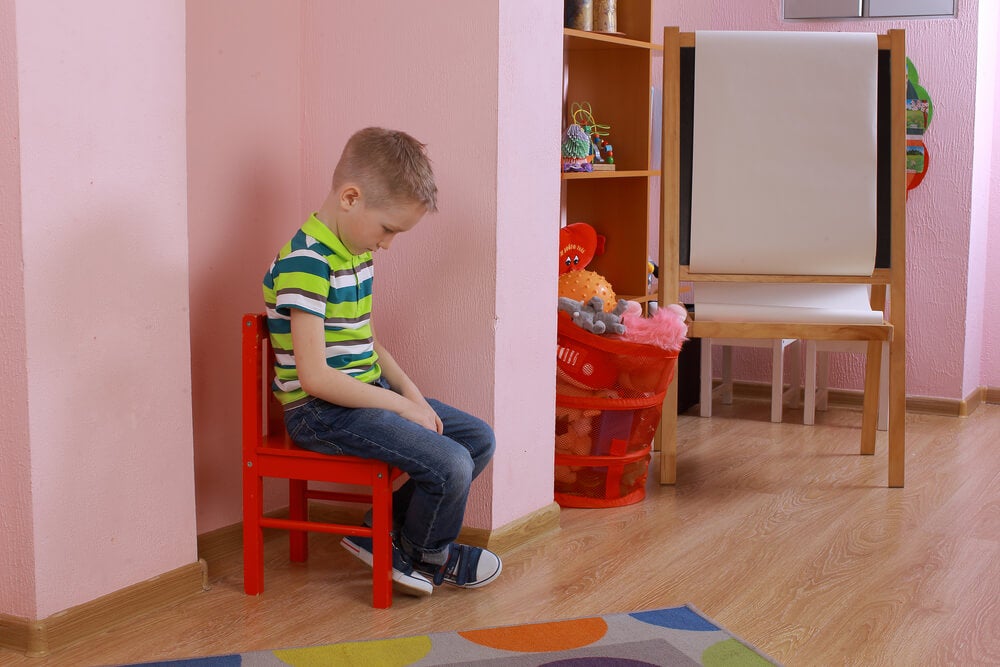5 Mistakes When Punishing Children

One of the strategies in the field of discipline is the application of punishments. However, the issue of the application of punishment often creates concern among parents, since there are no standards on how to administer them.
Clarify that when we refer to punishment, it is not only physical punishment (clearly reprehensible), but also a set of consequences that are linked to a response from the child, and that make this tend to decrease.
The problem is that you have to know how to correctly apply the punishments so that the responses that we want to extinguish are really reduced until they disappear. For that reason, in this article we share 5 mistakes when it comes to punishing children; things you should not do when punishing.
Discipline is necessary
Both children and young people need discipline to develop their talents and learn productive capacities. It is precisely the family that teaches children to socialize.
In fact, parents are that point of union between the subject and society. This environment allows you to lay the foundation for your personality and absorb the basics of culture.

However, their social development goes hand in hand with the formation of behavior. This implies that, on some occasions, children have to adjust to the moral norms and values necessary to live within the family and community in a harmonious way.
It is at this point that some parents use disciplinary measures such as punishments. What does this strategy consist of? We will explain to you below.
What is parental punishment
It is considered as a group of disciplinary measures. These strategies seek correction or reprimand to regulate behavior; in this case, from parents to children. Likewise, punishments can also help in the control and intervention of negative behaviors.
Errors when punishing children
Before pointing out some mistakes when it comes to punishing children, it is necessary to underline that punishments should be viewed as educational means.
In other words, disciplinary measures have to promote personal development. This can be achieved through learning negative behaviors in order to avoid them.
This does not mean that the goal of parents is to impose on their children the sense of obedience through rewards or punishments; that is, in a pragmatic way.
Rather, the goal of discipline is that children can internalize moral and social values; preferably without the need for the pressure of deserving punishment.
On the other hand, it is important to clarify that good punishments do not harm children emotionally, physically, intellectually or socially.

On the contrary, as indicated by Dr. Antonio Rodríguez Pérez in his article ” Main models of family socialization” , the goal of the discipline is to stimulate “the independence and individuality of the child” , value open communication and recognize “the rights of one and the other ” .
Now, what are some mistakes when it comes to punishing children? Keep reading.
1. Failure to respect or establish precise limits and rules
As a first step, it is essential to talk with children about social and moral norms and values, as well as the importance and practical point of view in their life.
Likewise, children must know the specific behavior expected by parents depending on the occasion so as not to be punished in ignorance.
2. Impose punishments instantly
It is necessary to give warnings to teach self-control to the little one. In this way we will allow them to develop their reasoning. They will also learn to be aware of their actions and the repercussions of breaking the rules.
Applying punishments in the moment is not a loving act and neither does it promote the internalization of social and moral values. Therefore, give your little ones warnings in a timely manner.
3. Failure to carry out punishments or apply them at the wrong time
This is often another mistake when it comes to punishing children. There are parents who use punishment as a threat to calm their children; they let time go by and just don’t keep their word.
Similarly, applying punishment after hours is likely to confuse children. It may be carelessness or permissiveness. However, these behaviors do not benefit the little ones.
This is because they will not take the authority of the father or mother seriously in the following occasions or they will feel some uncertainty regarding their actions. So, if your children are deserving of punishment, be consistent and act in the moment making the reason very clear.
4. Apply inappropriate or disproportionate punishment
The punishment must be consistent and related to the established norm or limit that the child has overlooked. For example, if the conflict was generated by the soccer ball, the punishment should be related to the use of it. In other words, the punishment must be adjusted to the fault.

On the other hand, attention should be paid to ensuring that the punishment is as fair as possible. This has to be based on the level of seriousness of the transgression.
But if the punishment outweighs the offense, the child will not be able to fulfill them, he will be frustrated and the parents will feel guilty.
5. Implement corporal punishment
In some settings, this type of punishment continues due to its supposed effectiveness. However, corporal punishment has been found to modify a child’s behaviors.
Physical punishment increases antisocial or disruptive behaviors as well as the use of aggressive discipline ; which in turn, will affect them later, in their youth and adulthood.
Conclusions
It is true that punishment is not a prohibited action. In fact, the penalty is present in many areas of adult life. However, care must be taken with how it is carried out; making mistakes in punishing children can do more harm than good.
Remember, discipline should not exceed the limits of respect for the physical or emotional integrity of your children. So when disciplining, focus on building your conscience, not so much on obeying rules.
You will see that in this way you will not only be educating him; You will also help him build a foundation that will guide him throughout his life.
Bernardo Peña
Graduated in Psychology from the University of Jaén in 2010. Master’s in Clinical Psychology from the University of Almería (2011) and Master’s in Legal and Forensic Psychology from COPAO, Granada (2012). He has published 8 scientific articles and is the author of the following books: “General Psychopathology”, “Neurosciences: etiology of brain damage” and “Psychological Evaluation”. In addition, he is co – author of the book “ROA Model: Integration of Object Relations Theory and Attachment Theory”. He has participated in international conferences on clinical and forensic psychology. Since 2010 he has practiced professionally as a clinical and forensic psychologist, writer, trainer and university professor. Currently, he collaborates with various digital media.









